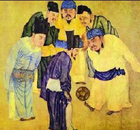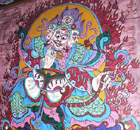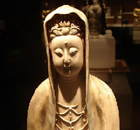Heritage
The Epic of Manas
(chinaculture.org)
Updated: 2006-11-21 14:30
 |
Large Medium Small |
??
Year: 2006
Sort: Folk Literature
Area: Xinjiang
Serial No.: Ⅰ-25
Declarer: Kizilsu Kirgiz. Autonomous Prefecture, and the Folk Litterateur and Artists' Association of the China Federation of Literary and Art Circles, Xinjiang Uygur Autonomous Region
The Kirgiz ethnic minority, with a total population of 141,549 (as of 1990), is scattered throughout southwestern Xinjiang Autonomous Region, mainly in the Kizilsu Kirgiz Autonomous Prefecture. The forefathers of the Kirgiz people lived in the upper reaches of the Yenisey River. Since the seventh century the Kirgiz land has been officially included as a part of China. The ancient Kirgiz mixed with the Turki, Mongolian and Uygur people, thus creating the features of the current Kirgiz people.
The epic is based on the story of a famous Kirgiz hero named Manas and his seven generations of descendants who led their people in fighting bravely against cruel rulers from other races, eventually winning their freedom. The epic mainly circulated in Southern and Northern Xinjiang, as well as other Central Asian Countries like Kyrgyzstan, Kazakhstan, and Northern Afghanistan.
Composed and sung entirely in oral form by various singers throughout the centuries, Manas is regarded as the epitome of oral creativity. Although it is not yet widely known, for want of adequate translations, Manas is considered to be one of the greatest examples of epic poetry, whose importance is not inferior to that of the Homeric epic.
Today there are about sixty versions of the epic Manas recorded from various epic singers and oral poets. Its longest version, consisting of half a million (500553) poetic lines, was written down from one of the last master-manasch (singers of Manas) Saiakbai Karalaev (1894-1971). The epic is indeed unique in its size. It is twenty times longer than the Homeric epics Iliad (15,693) and Odyssey (12,110) taken together and two and a half times the length of the Indian epic Mahabharata.
The Epic of?Manas should not only be recognized for its vast size, but it should equally be valued for its exceptionally poetic language and rich content. Manas is an encyclopedic collection of all Kirgiz myths, folk tales and legends brought together in time and centered around the hero Manas. The Epic of?Manas is not only the history of the Kirgiz people, it is a true epic drama which widely reflects all the aspects of their lives: and encompasses, their ethnic composition, economy, traditions and customs, morals and values, aesthetics, codes of behavior, their relationship with their surroundings and nature, their religious worldviews, their knowledge about astronomy and geography, and artistic oral poetry and language.
The Kirgiz believe that the creation of The Legend of Manas, as well as the wandering bards who sing it, depended not only on inspiration or hard-work but heaven-sent charisma and talent. It is said that some singers of Manas are so gifted that they learn how to recite the entire epic in just one night. With the passing away and aging of some epic singers, the epic is in danger of dying out and needs protection.










